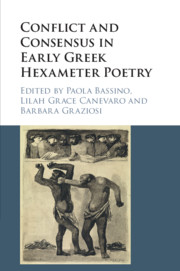25 results
Chapter 2 - Divine Conflict and the Problem of Aphrodite
- from Part I - Gods
-
-
- Book:
- Conflict and Consensus in Early Greek Hexameter Poetry
- Published online:
- 27 April 2017
- Print publication:
- 06 April 2017, pp 39-61
-
- Chapter
- Export citation
Bibliography
-
- Book:
- Conflict and Consensus in Early Greek Hexameter Poetry
- Published online:
- 27 April 2017
- Print publication:
- 06 April 2017, pp 208-222
-
- Chapter
- Export citation
Part II - Heroes
-
- Book:
- Conflict and Consensus in Early Greek Hexameter Poetry
- Published online:
- 27 April 2017
- Print publication:
- 06 April 2017, pp 85-170
-
- Chapter
- Export citation
Part I - Gods
-
- Book:
- Conflict and Consensus in Early Greek Hexameter Poetry
- Published online:
- 27 April 2017
- Print publication:
- 06 April 2017, pp 15-84
-
- Chapter
- Export citation
Contributors
-
- Book:
- Conflict and Consensus in Early Greek Hexameter Poetry
- Published online:
- 27 April 2017
- Print publication:
- 06 April 2017, pp vii-viii
-
- Chapter
- Export citation

Conflict and Consensus in Early Greek Hexameter Poetry
-
- Published online:
- 27 April 2017
- Print publication:
- 06 April 2017
Index of Passages
-
- Book:
- Conflict and Consensus in Early Greek Hexameter Poetry
- Published online:
- 27 April 2017
- Print publication:
- 06 April 2017, pp 223-225
-
- Chapter
- Export citation
Abbreviations
-
- Book:
- Conflict and Consensus in Early Greek Hexameter Poetry
- Published online:
- 27 April 2017
- Print publication:
- 06 April 2017, pp ix-x
-
- Chapter
- Export citation
General Index
-
- Book:
- Conflict and Consensus in Early Greek Hexameter Poetry
- Published online:
- 27 April 2017
- Print publication:
- 06 April 2017, pp 226-228
-
- Chapter
- Export citation
Part III - Men
-
- Book:
- Conflict and Consensus in Early Greek Hexameter Poetry
- Published online:
- 27 April 2017
- Print publication:
- 06 April 2017, pp 171-207
-
- Chapter
- Export citation
Contents
-
- Book:
- Conflict and Consensus in Early Greek Hexameter Poetry
- Published online:
- 27 April 2017
- Print publication:
- 06 April 2017, pp v-vi
-
- Chapter
- Export citation
Introduction
-
-
- Book:
- Conflict and Consensus in Early Greek Hexameter Poetry
- Published online:
- 27 April 2017
- Print publication:
- 06 April 2017, pp 1-14
-
- Chapter
- Export citation
Copyright page
-
- Book:
- Conflict and Consensus in Early Greek Hexameter Poetry
- Published online:
- 27 April 2017
- Print publication:
- 06 April 2017, pp iv-iv
-
- Chapter
- Export citation
3 - Close encounters with the ancient poets
- from Part II - Reviving dead poets
-
-
- Book:
- Creative Lives in Classical Antiquity
- Published online:
- 01 December 2016
- Print publication:
- 21 November 2016, pp 51-74
-
- Chapter
- Export citation
Chapter 3 - Theologies of the family in Homer and Hesiod
-
-
- Book:
- Theologies of Ancient Greek Religion
- Published online:
- 05 August 2016
- Print publication:
- 03 August 2016, pp 35-61
-
- Chapter
- Export citation
THE HOMERIC TEXT
-
- Article
- Export citation
(C.) Pelling and (M.) Wyke Twelve Voices from Greece and Rome: Ancient Ideas for Modern Times. Oxford: University Press, 2014. Pp. 274, illus. £18.99. 9780199597369.
-
- Journal:
- The Journal of Hellenic Studies / Volume 135 / 2015
- Published online by Cambridge University Press:
- 22 October 2015, pp. 206-207
- Print publication:
- 2015
-
- Article
- Export citation
5 - Greek lyric and early Greek literary history
- from Part I: - Contexts and topics
-
-
- Book:
- The Cambridge Companion to Greek Lyric
- Published online:
- 28 May 2010
- Print publication:
- 30 April 2009, pp 95-113
-
- Chapter
- Export citation
Literature - (R.) Bittlestone Odysseus Unbound. The Search for Homer's Ithaca. With J. Diggle and J. Underhill. Cambridge UP, 2005. Pp. xx + 598. £25. 9780521853576. - (G.) Le Noan The Ithaca of the Sunset. Essay about the Location of Ulysses' Country. (Collection ‘Commentaires’). Paris: Editions Tremen, 2005. Pp. 126, illus. €21. 9782913559448. - (C.I.) Tzakos Ithaca and Homer (The Truth). The Renowned Island as Described in the Odyssey. Translated by G. Cox. Athens: unknown publisher, 2005. Pp. 271, illus. 9789607103383.
-
- Journal:
- The Journal of Hellenic Studies / Volume 128 / November 2008
- Published online by Cambridge University Press:
- 13 January 2010, pp. 178-180
- Print publication:
- November 2008
-
- Article
- Export citation
(D.) Clay Archilochos Heros. The Cult of Poets in the Greek Polis. Washington, DC: Center for Hellenic Studies; Cambridge, MA: Harvard UP, 2004. $39.95. 0674014553. - (M.) Schmidt The First Poets. Lives of the Ancient Greek Poets. London: Weidenfeld and Nicolson, 2004. Pp. ix + 449. £20. 0297643940.
-
- Journal:
- The Journal of Hellenic Studies / Volume 126 / November 2006
- Published online by Cambridge University Press:
- 23 February 2012, pp. 153-154
- Print publication:
- November 2006
-
- Article
- Export citation



